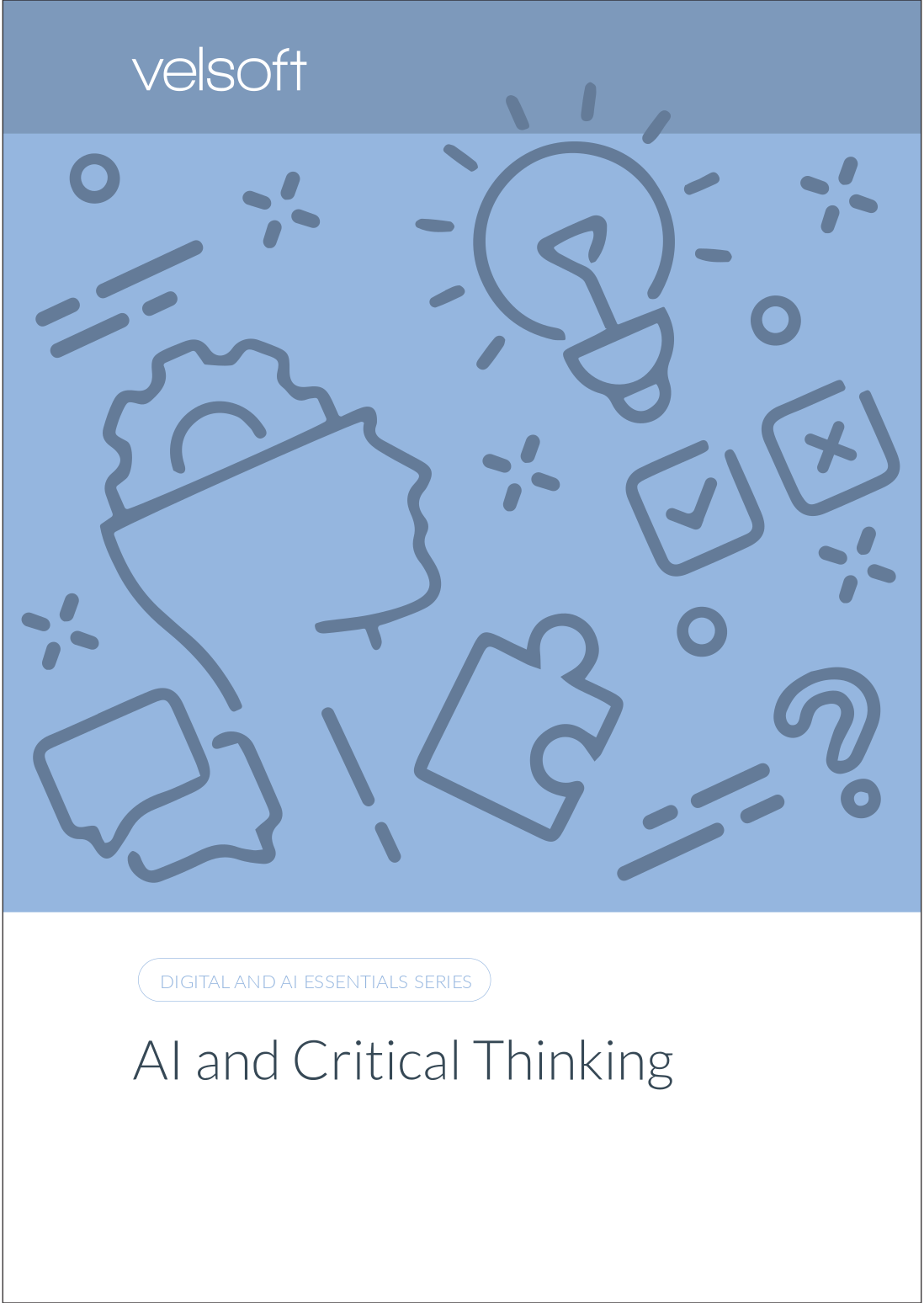From the corner office to the front lines, critical thinking is the bedrock of effective decision-making, problem-solving, and innovation in today’s fast-paced business environment. It’s not just a desirable skill—it’s the key to unlocking creativity, fueling growth, and navigating challenges. At its core, critical thinking drives businesses forward, helping them stay agile and resilient amidst competition. For companies, investing in this capability within their teams is nothing short of an investment in their future.
But here’s where the conversation gets interesting: the rise of AI in the workplace has opened a new frontier. AI is often associated with automation and streamlining, but its potential runs far deeper. Used correctly, AI can enhance critical thinking rather than limit it, becoming a tool for smarter, more informed decision-making. At the intersection of AI and human intuition, the real power emerges. But it takes a responsible approach to get there—one that we’ll explore today.
AI and Critical Thinking: A Strategic Alliance
Critical thinking in the workplace isn’t just about solving problems. It’s about evaluating information, challenging assumptions, and making decisions that are thoughtful and grounded in logic. AI, in this context, can serve as a powerful ally—providing insights, identifying patterns, and offering data-driven predictions. But to reap these benefits, companies must train their employees to use AI critically, not passively.
AI doesn’t replace human intuition; it enhances it. That’s why offering training on AI and critical thinking isn’t just a nice-to-have—it’s a strategic move that yields tangible benefits. The key is understanding the synergy between AI and humans and using AI as a tool to sharpen, not dull, human insight.
The Foundations of Critical Thinking in AI and the Workplace
Let’s start with the basics. To use AI effectively, you must apply core principles of critical thinking:
- Skepticism: AI is only as good as the data it’s trained on. Question its outputs. Don’t assume that because it’s AI, it’s infallible.
- Analysis: Break down AI’s results into understandable components. What data was it using? How did it arrive at this conclusion?
- Evaluation: Assess the credibility of AI-generated insights. Were there biases in the data? Is this result consistent with your expectations?
By applying these principles, businesses can ensure that AI becomes a tool for smarter, more informed decision-making.
The Ethical Lens: Recognizing AI’s Limits and Biases
AI isn’t just about crunching numbers. It’s about making decisions that impact real people and real outcomes. That’s why it’s critical to consider the ethical implications of AI. For example, when evaluating an AI system that predicts customer behavior, think about the biases inherent in the data. Is it inclusive? Does it perpetuate stereotypes? Businesses must train employees to recognize these issues, ensuring AI is applied not only efficiently but ethically.
Understanding AI’s ethical limitations is part of responsible use. This means drawing insights from multiple disciplines—ethics, law, and social sciences—to ensure AI applications are fair and just. After all, technology without responsibility is just a liability waiting to happen.
AI Enhancing Critical Thinking in the Workplace
The potential of AI to enhance critical thinking goes far beyond automation. Here’s how it can transform the way we approach challenges:
- Data Analysis and Pattern Recognition: AI excels at processing vast amounts of data and recognizing trends that may not be immediately visible to humans. This makes it a powerful tool for decision-making in fields such as finance, healthcare, and marketing.
- Predictive Analytics: By analyzing historical data, AI can predict future trends, helping businesses stay ahead of the curve. This enhances strategic planning, risk assessment, and resource management.
- Information Retrieval: AI tools such as IBM Watson or Google Scholar can quickly retrieve and analyze information, saving valuable time for researchers and executives alike.
But here’s the real kicker: AI doesn’t just deliver answers. It sparks curiosity. By showing us patterns and insights we may have missed, it encourages us to dig deeper, ask better questions, and approach problems from new angles. It’s not about giving us all the answers—it’s about making us think more critically about the answers we get.
AI and Problem-Solving: A New Approach
AI’s value in the workplace goes beyond simple data processing. It can help reimagine how we solve problems. By simulating scenarios, testing strategies, and offering a range of potential solutions, AI empowers teams to think creatively and collaboratively. In essence, AI becomes a brainstorming partner—one that pushes us to approach challenges with fresh perspectives.
The Future of AI and Critical Thinking Training
Here’s the bottom line: AI isn’t a magic wand, but it is a powerful tool—if used responsibly. That’s why companies should prioritize training their teams not just in AI technologies but in the critical thinking skills necessary to use AI wisely. Our newest course: AI & Critical Thinking was designed with this very mission in mind.
It educates employees on how to use AI with a critical, ethical, and responsible lens, enhancing their problem-solving capabilities without sacrificing human intuition. The course explores the fundamentals of AI, its ethical implications, and its applications across industries, all while honing critical thinking. From data privacy to bias detection, from healthcare to finance, the training equips students to assess AI implementations and propose responsible, real-world solutions.
The Takeaway: AI in the Workplace
At the end of the day, AI is not about replacing human effort—it’s about enhancing it. Critical thinking remains the cornerstone of innovation and decision-making in any workplace, and AI, when wielded properly, is a powerful tool for amplifying that skill. The future of work belongs to those who can master this balance, using AI to push their thinking further and make smarter, more informed decisions.
The businesses that thrive tomorrow will be the ones that invest today in building teams capable of navigating AI’s potential with wisdom, ethics, and critical insight. And that’s where the true value lies.



